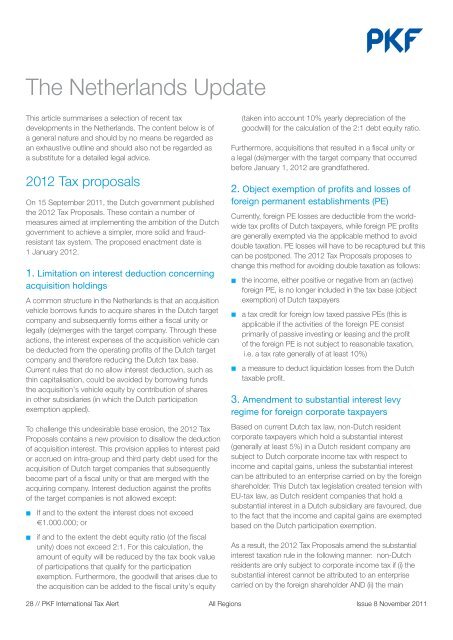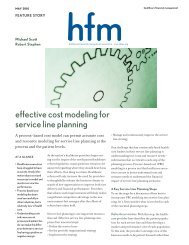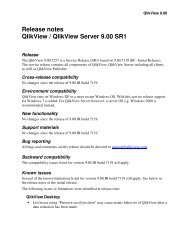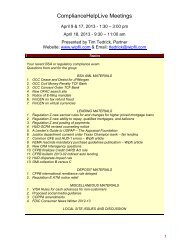Download PDF - Wipfli
Download PDF - Wipfli
Download PDF - Wipfli
You also want an ePaper? Increase the reach of your titles
YUMPU automatically turns print PDFs into web optimized ePapers that Google loves.
The Netherlands Update<br />
This article summarises a selection of recent tax<br />
developments in the Netherlands. The content below is of<br />
a general nature and should by no means be regarded as<br />
an exhaustive outline and should also not be regarded as<br />
a substitute for a detailed legal advice.<br />
2012 Tax proposals<br />
On 15 September 2011, the Dutch government published<br />
the 2012 Tax Proposals. These contain a number of<br />
measures aimed at implementing the ambition of the Dutch<br />
government to achieve a simpler, more solid and fraudresistant<br />
tax system. The proposed enactment date is<br />
1 January 2012.<br />
1. Limitation on interest deduction concerning<br />
acquisition holdings<br />
A common structure in the Netherlands is that an acquisition<br />
vehicle borrows funds to acquire shares in the Dutch target<br />
company and subsequently forms either a fiscal unity or<br />
legally (de)merges with the target company. Through these<br />
actions, the interest expenses of the acquisition vehicle can<br />
be deducted from the operating profits of the Dutch target<br />
company and therefore reducing the Dutch tax base.<br />
Current rules that do no allow interest deduction, such as<br />
thin capitalisation, could be avoided by borrowing funds<br />
the acquisition’s vehicle equity by contribution of shares<br />
in other subsidiaries (in which the Dutch participation<br />
exemption applied).<br />
To challenge this undesirable base erosion, the 2012 Tax<br />
Proposals contains a new provision to disallow the deduction<br />
of acquisition interest. This provision applies to interest paid<br />
or accrued on intra-group and third party debt used for the<br />
acquisition of Dutch target companies that subsequently<br />
become part of a fiscal unity or that are merged with the<br />
acquiring company. Interest deduction against the profits<br />
of the target companies is not allowed except:<br />
■<br />
■<br />
If and to the extent the interest does not exceed<br />
€1.000.000; or<br />
if and to the extent the debt equity ratio (of the fiscal<br />
unity) does not exceed 2:1. For this calculation, the<br />
amount of equity will be reduced by the tax book value<br />
of participations that qualify for the participation<br />
exemption. Furthermore, the goodwill that arises due to<br />
the acquisition can be added to the fiscal unity’s equity<br />
(taken into account 10% yearly depreciation of the<br />
goodwill) for the calculation of the 2:1 debt equity ratio.<br />
Furthermore, acquisitions that resulted in a fiscal unity or<br />
a legal (de)merger with the target company that occurred<br />
before January 1, 2012 are grandfathered.<br />
2. Object exemption of profits and losses of<br />
foreign permanent establishments (PE)<br />
Currently, foreign PE losses are deductible from the worldwide<br />
tax profits of Dutch taxpayers, while foreign PE profits<br />
are generally exempted via the applicable method to avoid<br />
double taxation. PE losses will have to be recaptured but this<br />
can be postponed. The 2012 Tax Proposals proposes to<br />
change this method for avoiding double taxation as follows:<br />
■<br />
■<br />
■<br />
the income, either positive or negative from an (active)<br />
foreign PE, is no longer included in the tax base (object<br />
exemption) of Dutch taxpayers<br />
a tax credit for foreign low taxed passive PEs (this is<br />
applicable if the activities of the foreign PE consist<br />
primarily of passive investing or leasing and the profit<br />
of the foreign PE is not subject to reasonable taxation,<br />
i.e. a tax rate generally of at least 10%)<br />
a measure to deduct liquidation losses from the Dutch<br />
taxable profit.<br />
3. Amendment to substantial interest levy<br />
regime for foreign corporate taxpayers<br />
Based on current Dutch tax law, non-Dutch resident<br />
corporate taxpayers which hold a substantial interest<br />
(generally at least 5%) in a Dutch resident company are<br />
subject to Dutch corporate income tax with respect to<br />
income and capital gains, unless the substantial interest<br />
can be attributed to an enterprise carried on by the foreign<br />
shareholder. This Dutch tax legislation created tension with<br />
EU-tax law, as Dutch resident companies that hold a<br />
substantial interest in a Dutch subsidiary are favoured, due<br />
to the fact that the income and capital gains are exempted<br />
based on the Dutch participation exemption.<br />
As a result, the 2012 Tax Proposals amend the substantial<br />
interest taxation rule in the following manner: non-Dutch<br />
residents are only subject to corporate income tax if (i) the<br />
substantial interest cannot be attributed to an enterprise<br />
carried on by the foreign shareholder AND (ii) the main<br />
28 // PKF International Tax Alert All Regions<br />
Issue 8 November 2011
















